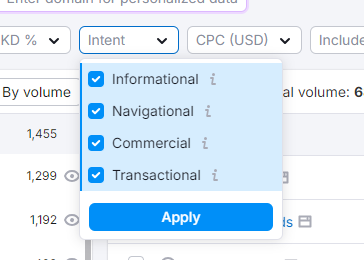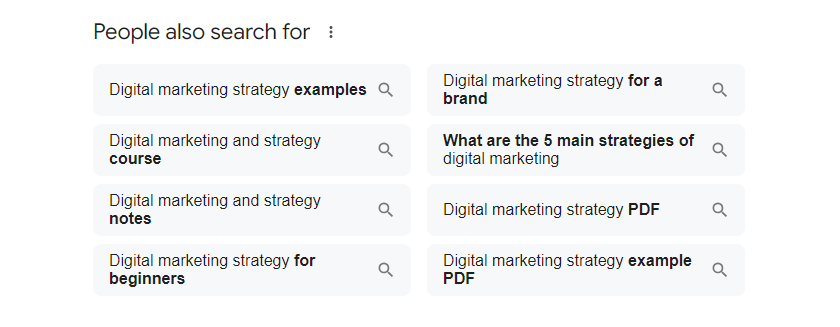What are keywords?
When we search for something online, we use specific words or phrases known as keywords.
For example, if you want to buy a new jacket, you can type “men’s leather jacket” or “women’s leather jacket” into Google. Even though it is a combination of words, it will still be considered a keyword.
Although most people call these Google searches or queries, they are called keywords in the world of SEO.
Why are keywords essential?
Keywords are essential because your website or blog will appear first when people type keywords into search engines.
For example, if you search for a “transactional keyword” in Google, it will appear at the top of Google because the search volume for this keyword is 170, and the competition is 0.02.
If it appears at the top of Google, many visitors will visit your website and learn more about different keywords. However, if you only search by “keyword,” your website or blog may not reach the top of Google.
Here explain different keyword types with examples

Keywords based on length
Various keywords need to be used to help your website or blog get found. So, by using a mix of short and long words that people can search for, you can reach people with different mindsets. This will help you attract different groups of readers and provide them with the information they seek. For example,
- Long-tail– That contains 3+ words. Search volume is not very competitive. For example “Where did the dinosaur extinction asteroid hit?”
- Mid-tail – That contains 2 words. Search volume is moderately competitive. For example, “dinosaur extinction asteroid”
- Short-tail – That contains 1 or 2 words. Search volume is very competitive. For example “asteroid”
Search Intent

Search intent is also known as “user intent.” A user’s primary objective is to search by typing a keyword into a search engine. Generally, the purpose of any search is informational, commercial, navigational, and transactional.
For example, you want to cook some pasta for dinner. But if you’re hungry and want to eat right away, the word you use to cook pasta quickly and in less time is “pasta.”
But when you don’t get the desired results with these keywords, you search for “2-minute pasta” or “2-minute pasta recipes.” This is how the search intent is expressed.
- Informational: Informational keywords are words or phrases that searchers use to learn about a topic when searching. They search for that word or phrase to find general information or the answer to a specific question.
Examples of informational keywords encompass phrases such as “how to”, “why”, “what is”, “benefits of”, “tips for”, and similar expressions.
- Commercial: A consumer types commercial intent keywords into a search engine to purchase a product or service. To buy a product or service, one needs to know the details of that product.
In other words, commercial intent keywords are searched for to attract people to your product or service. An illustration of a keyword exhibiting commercial intent is “best email marketing tools.”
- Transactional: Transactional keywords strongly encourage a purchase or action to purchase a product or service. These keywords are used with paid advertising and fully optimized products. Also, users can go to your site immediately with these keywords.
Frequently, transactional queries contain keywords like “buy”, “for sale”, “discount”, and “near me.”
- Navigational: Users use navigational keywords to enter search engines to reach a specific website, brand, or online address. Instead of searching for general information or products, navigational keywords are used to find routes the user already knows about a site.
For example, near me, directions to, prices, cost of, etc.
Match types
Keywords help show ads like specific words or phrases when people search online.
These are called match-type keywords. For example, a broad match shows ads for a broad search, while a specific search requires an exact match.
- Board match: Broad match is the usual keyword match type in online advertising. It assigns all your keywords to this match type, allowing your ads to reach a wide audience without needing an extensive list.
- Phrase match: A keyword match type that allows you to show your ads on searches that make sense for your keywords. It is used to define the meaning of keywords and more specific forms of the meaning of keywords searched by the user. It helps you reach more searches than an exact match and less than a broad match.
- Exact match: Exact Match is a keyword match type offered by Google Ads and Bing Ads. It enables advertisers to target users searching for the same keyword they are bidding on or very close variations of it.
Primary Keywords
A primary or focus or main keyword is the primary term or phrase a webpage is intended to rank for in search engine results. It is the main keyword for which a page is specifically optimized.
Secondary keywords
Secondary keywords add detail and amplify critical terms in a given search context. They are usually much more specific and directly related to the user’s intent for the search. You can add different keywords to rank higher in SERPs.
LSI keywords

LSI means Latent Semantic Indexing, which is how words and concepts are linked in search engines. In online marketing, an LSI keyword is a term that you want search engines to identify with keywords that are closely related to the keyword.
Relevant words help search engines understand your title, which can increase your content’s visibility in search results.
Why are LSI keywords important for SEO?
LSI keywords are usually used to improve the search function by guessing what people are looking for and you should use LSI keywords on your webpage to help improve the ranking of content, blog, or website.
How can you find LSI keywords?
Search for LSI keywords through search engines. You type a specific phrase or word into Google Search to find your relevant LSI keywords and search terms. So if you want your page to rank for “credit card” the LSI keywords would be “money”, “credit score” and “interest rate”.
Competitors’ keywords
Competitors’ keywords are keywords that similar topic authors or website owners of your content rank for in Google search results on the same topic. They can rank organically and spend money on Google ads to rank in search results.
Conclusion
Understanding the Different types of keywords is vital for optimizing content and enhancing search engine rankings.
By incorporating a diverse range of keywords, including long-tail and LSI keywords, website owners can attract more relevant traffic and boost their online presence.
Keeping abreast of keyword trends and search behaviors further supports a successful keyword strategy. Overall, a well-rounded approach to keyword usage significantly influences the effectiveness of a digital marketing strategy.
To know more information read Ahrefs blog
